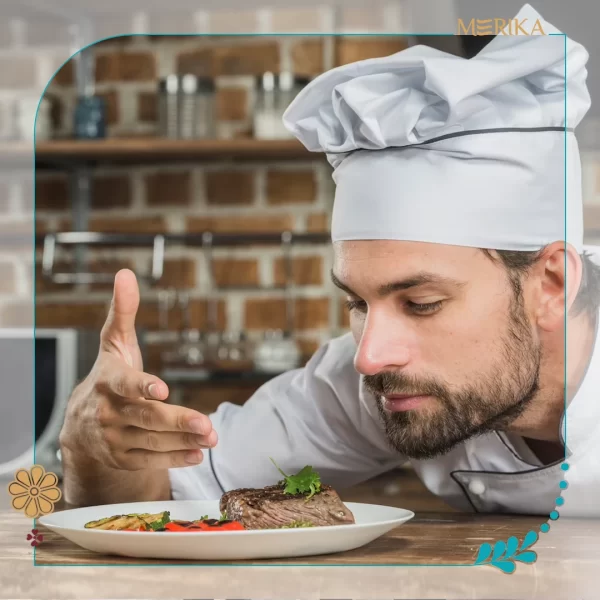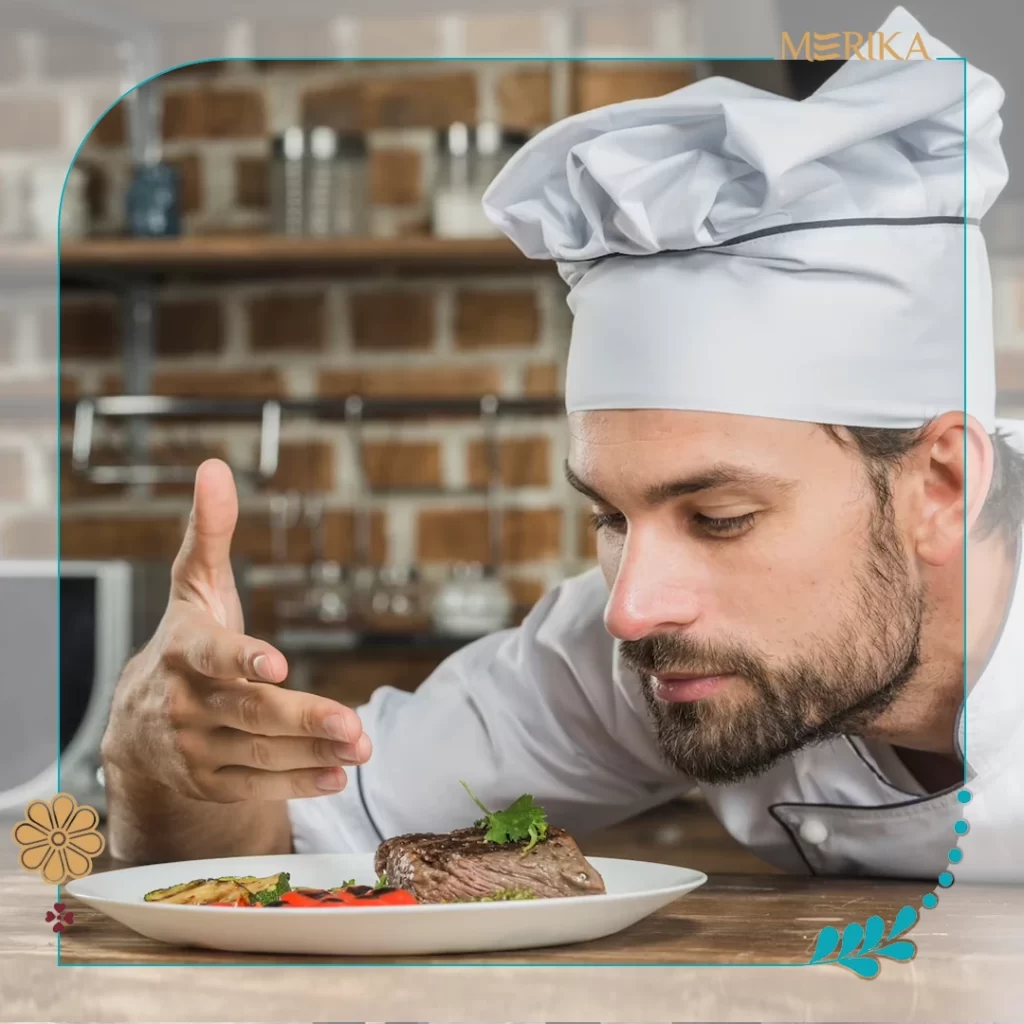Creative Restaurant Head Chef: The Mastermind Behind the Menu

In a cooking area, the head chef is the manager, directing and advising the other chefs. They frequently oversee hygienic procedures, manage supplies, and teach new staff. Discovering more about what head chefs do can be helpful if you’re thinking about pursuing that career. This post aims to offer an answer to the question: “What is the?” topic of discussion?” does a head chef do?” outline the qualifications needed for the position, go into detail about the workplace, examine the typical pay, and offer useful advice for those interested in a career in the culinary arts.

Crafting Culinary Perfection: The Role of a Head Chef in a Restaurant
The head chef is responsible for the customers’ gastronomic pleasure and eating satisfaction. Chefs oversee the entire food process production, from the beginning to the final delivery.
They frequently investigate recent culinary tendencies to apply their creative skills and create various foods to suit the customers’ interests. Additionally, they oversee the efficiency of food materials and products, assign work to the culinary workers, and supervise the employees. A head chef must be well organized and have excellent interpersonal abilities in addition to following the strictest cleanliness guidelines and attending to the questions and issues of the customers.
Balancing Creativity and Practicality Of a Head Chef
Chefs may become interested in food because they have a unique need to turn raw materials into something that improves how people feel.
You’re frequently divided between the cuisine you want you could provide and the demands that every restaurant owner faces in today’s environment, though, when it pertains to establishing a menu for yourself after instruction and the daily routine of making your head up the queue.
How to Make Business Choices While Maintaining Creativity in Chefs?
Therefore, how does a culinary professional resolve the conflict between creativity and common sense? Here are a few ideas.
- The Creative is Always Superior: We have created an opportunity for innovation by concentrating on producing the best of everything.
- Add your unique spin to the classics: Give it your own while preserving a classic recipe’s essential elements.
- Classics are Well-Known for a Purpose: Rock ‘n’ roll classics endure. Remember what foods should belong on your dish of choice when considering what is popular with everyone.
- Give Regard to a Dish’s Past: discover the origins of a dish’s popularity. Learn about its history and rise to popularity. The tale is significant and contributes to a product’s validity.
- Tasting First: Whenever it boils, delicious cuisine gets the finest reactions from everyone. The flavor is what draws people back time and time again.
- The Experience is Important: When you create an experience behind a meal, staff members and clients become more enthusiastic.
From Kitchen Apprentice to Head Chef: The Journey to the Top
For every individual, the road to acquiring a culinary expert is different. While some chefs pursue an academic career, others hone their abilities by working in commercial restaurants. The criteria for a head chef can vary based on the scope and reputation of the cuisine. The following are some prerequisites in general for head chefs:
Experience
The chief chef is typically a culinary boss. Thus, he must hold several years of managerial skills and cuisine expertise before assuming the position. Before being eligible for a position as head chef, a chef might require a minimum of five years of cooking expertise in restaurant kitchens, according to the place of work. Before cooking on their own, several head chefs receive training from other chefs and undergo apprenticeships. To operate in various chef jobs, a head chef needs expertise in every aspect of the kitchen area, from starters to desserts.
Here is a Head Chef job description template
Education
University learning is common among head chefs but is optional. Joining a cooking curriculum can broaden your cooking horizons while enhancing your professional cooking skills. A culinary career can be obtained in one to four years, according to the student and the study institution.
Skills
Head chefs frequently combine their managerial, leadership, and culinary talents to establish and sustain efficient kitchen settings. They pledge ongoing development and work to develop their workforce successfully.
Café and Restaurant Head Chef skills
What abilities do you think an excellent chef should have? They are undoubtedly numerous and diverse. A skilled cook should not only be an expert with extensive culinary knowledge and skills. However, flawless cannot be achieved, but also have some of the abilities we have included in the following section.
- Leadership in the Kitchen: Manage the food preparation process and related tasks effectively.
- Adaptability and Quick Thinking: The ideal chef is adaptable and mindful of the requirements and desires of their customers.
- Mastering the Basics: The ideal chef attends to every little thing, meal after meal. When running culinary maintenance, there is seldom a day less significant than another; attention to detail is crucial.
- The Art of Menu Creation: Observing how something that is initially just an idea, an odd pairing, or a taste may develop into a brand-new dish and an unforgettable culinary pleasure for your guests is fascinating. However, originality on its own doesn’t mean anything.
- Staying Up-to-Date: Research Current culinary fads and improved kitchen procedures
- Reliability and Accountability: The ideal chef is conscientious and considers the cooking process and conditions.
- Prediction and Preparation: The ideal chef foresees what the cooking area requires.
Food Quality in Franchise Restaurants: The Role of a Head Chef
A head chef is charged with a wide range of duties. They manage and make all kitchen tasks, at the very least. The head of the kitchen, commonly referred to as the culinary head or Executive Chef, ensures that his crew consistently produces effective, high-quality work and that customers are happy. Sustainability in the food sector depends on having a Head Chef who is certified and skilled.
It takes constant effort to achieve and sustain quality in an efficient kitchen.
Developing a correct mindset and paying attention to every aspect can often distinguish between excellent and exceptional. A great kitchen manager develops these qualities for their team and themselves. They accept full accountability for the accomplishments of their team and cuisine.
The Head Chef primarily performs back-of-the-house duties, including developing recipes and menus and managing supplies, planning, and budgeting for daily operations. The upkeep of the kitchen’s productivity and the ongoing creation of high-quality meals are other key responsibilities of the position.
Head chefs put in a lot of labor because they are ultimately responsible for the restaurant’s achievement or loss. They frequently spend the day or weekend in their cuisine.

+10 Best Cafe Events Ideas To Make Your Customers Even Happier!
It would seem a thorough job to arrange some cafe events’ ideas to attract many new customers and keep the old ones more satisfied. As a cafe owner, unless you

2024 Dessert Trends: Great 5 Sweetie Pastries of This Year to Bite-on!
Nothing is more satisfying than a hot chimney cake freshly baked and served after the morning black cup of coffee or a hot Bagal to fill your afternoon delicacy! For

Top 6 Things Your Customers Want From a Café Location
When choosing a café location to spend their time at, customers have specific preferences that can significantly influence their decision. Cafe owners or investors must also consider cafe location concerns,

